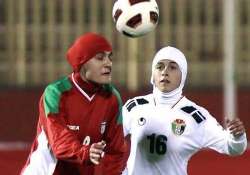Prince Ali hits out at FIFA's headscarf advice
Budapest (Hungary), May 26: Hitting out at FIFA's medical advisers, Prince Ali of Jordan said he was disturbed by their tests which could prevent Muslim women football players from wearing headscarves to respect their cultural

Budapest (Hungary), May 26: Hitting out at FIFA's medical advisers, Prince Ali of Jordan said he was disturbed by their tests which could prevent Muslim women football players from wearing headscarves to respect their cultural tradition.
The FIFA board member said on Friday he was "quite shocked" to hear its medical advisers describe two scarf designs as a danger to health.
"I'm usually not very emotional but I was very disturbed by the comment," said Prince Ali, who has pushed efforts to reverse a FIFA ban on headscarves imposed for safety reasons in 2007.
Prince Ali won praise from FIFA's rules-making body after presenting his case in March. The panel, known as IFAB, said it intended to approve the scarves for use but asked for a final medical opinion ahead of a scheduled July 5 meeting in Zurich.
However, FIFA's medical committee chairman Michel D'Hooghe said on Thursday that female players wearing the scarves could sustain head and neck injuries, or overheat.
"I am a little disturbed about these being used as arguments," said Prince Ali, a FIFA vice president representing Asia. "If they want to do a proper evaluation, do it on the pitch."
Testing on two scarves was conducted in an office at FIFA's Swiss headquarters last month. One design from the Netherlands uses quick-release velcro fasteners, and a Canadian scarf is fixed with light magnets.
"I am concerned there is no seriousness in the testing, or no desire. I hope this issue will be treated with the same respect and dignity that other issues are treated with, like goal line technology," he said.
D'Hooghe, a Belgian doctor who also sits alongside Prince Ali on FIFA's executive committee, said modified designs to update the rejected ones would arrive at FIFA "in the coming days."
Denying this was accurate, Prince Ali said the two scarves were the finished design.
Prince Ali said he felt "responsible" for the debate, which has won backing from the United Nations and the Nobel Prize Committee.
"We are asking for women to be able to play football in the field, no matter who they are," he said.
FIFA does allow Islamic women to cover their hair with a scarf in matches sanctioned by confederations and national football authorities.
However, the ban extends to FIFA matches including finals tournaments and qualifiers for Women's World Cups at all age levels and Olympics events. The Islamic nation of Azerbaijan hosts the Under-17 Women's World Cup from Sept. 22-Oct. 13.
"I have done everything I can, and it's an issue that won't go away," the prince said.
The IFAB panel includes the four British football associations, which have one vote each, and FIFA which has a four-vote bloc. Six votes are needed to change a rule.
The FIFA board member said on Friday he was "quite shocked" to hear its medical advisers describe two scarf designs as a danger to health.
"I'm usually not very emotional but I was very disturbed by the comment," said Prince Ali, who has pushed efforts to reverse a FIFA ban on headscarves imposed for safety reasons in 2007.
Prince Ali won praise from FIFA's rules-making body after presenting his case in March. The panel, known as IFAB, said it intended to approve the scarves for use but asked for a final medical opinion ahead of a scheduled July 5 meeting in Zurich.
However, FIFA's medical committee chairman Michel D'Hooghe said on Thursday that female players wearing the scarves could sustain head and neck injuries, or overheat.
"I am a little disturbed about these being used as arguments," said Prince Ali, a FIFA vice president representing Asia. "If they want to do a proper evaluation, do it on the pitch."
Testing on two scarves was conducted in an office at FIFA's Swiss headquarters last month. One design from the Netherlands uses quick-release velcro fasteners, and a Canadian scarf is fixed with light magnets.
"I am concerned there is no seriousness in the testing, or no desire. I hope this issue will be treated with the same respect and dignity that other issues are treated with, like goal line technology," he said.
D'Hooghe, a Belgian doctor who also sits alongside Prince Ali on FIFA's executive committee, said modified designs to update the rejected ones would arrive at FIFA "in the coming days."
Denying this was accurate, Prince Ali said the two scarves were the finished design.
Prince Ali said he felt "responsible" for the debate, which has won backing from the United Nations and the Nobel Prize Committee.
"We are asking for women to be able to play football in the field, no matter who they are," he said.
FIFA does allow Islamic women to cover their hair with a scarf in matches sanctioned by confederations and national football authorities.
However, the ban extends to FIFA matches including finals tournaments and qualifiers for Women's World Cups at all age levels and Olympics events. The Islamic nation of Azerbaijan hosts the Under-17 Women's World Cup from Sept. 22-Oct. 13.
"I have done everything I can, and it's an issue that won't go away," the prince said.
The IFAB panel includes the four British football associations, which have one vote each, and FIFA which has a four-vote bloc. Six votes are needed to change a rule.